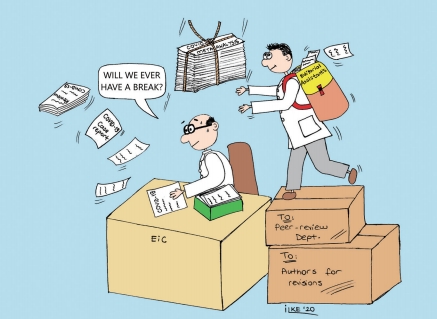The impact of the COVID-19 pandemic on science editing
Article information

The coronavirus disease 2019 (COVID-19) pandemic has had a major impact on populations throughout the world. Although the most detrimental consequences have been seen for public health, several aspects of human life have been affected by the pandemic, including science editing.
Science editing requires collaboration among editors, reviewers, authors, journal staff, and print and delivery services. Medical editors, reviewers, and authors are also actively practicing healthcare workers. During the pandemic, some had to realign their priorities due to additional daytime duties and/or night shifts. Prolonged lockdowns led to serious delays in print and delivery services. Cancellations of scientific and educational events, as well as disruptions of ongoing research activities, added to the complexity of the issue [1].
Starting from the beginning of this viral pandemic, researchers have focused their attention on studying COVID-19–related topics. The pathophysiology, diagnostic elements, treatment strategies, and overall impact of COVID-19 have been extensively studied. Researchers’ efforts have resulted in a tremendous volume of articles and related publications, placing an additional burden on science editors’ shoulders. Given the growing number of publications, another potential threat to quality publishing is plagiarism. Editors should apply a comprehensive strategy, instead of relying solely on anti-plagiarism tools [2].
In response to the pandemic, journals have adopted some measures to ensure safety for journal staff. For instance, roundtable meetings have been changed to online video meetings. Some journals have announced a number of changes to their reviewing processes and publishing decisions. Revision periods were extended, and in some cases, unreasonable revisions that would not change the conclusions of a manuscript were avoided [3,4].
The European Association of Science Editors issued a statement on quality standards for editors to ensure excellence in science editing during the pandemic [5]. Specifically, the European Association of Science Editors encouraged editors to ensure adherence to ethical principles and standard reporting guidelines, and to implement open data sharing. Simultaneously, editors were advised to avoid strict language requirements in order to accelerate the rapid transfer of knowledge [5].
Science editing is a hard task. It is much harder during the days of the pandemic. We should be aware of our responsibilities to preserve our journals for future generations.
Notes
Conflict of Interest
No potential conflict of interest relevant to this article was reported.
Funding
The author received no financial support for this case study.
